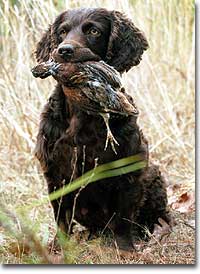

 The Accurate Reloading Forums
The Accurate Reloading Forums  THE ACCURATE RELOADING.COM FORUMS
THE ACCURATE RELOADING.COM FORUMS  Hunting
Hunting  Dogs
Dogs  Labradors and rattlesnakes
Labradors and rattlesnakesGo  | New  | Find  | Notify  | Tools  | Reply  |  |
One of Us |
I'm taking my chocolate Labrador out prairie chicken hunting and was warned about rattlesnakes. Is there some type of first aid kit for a dog I can take with me? /////////////////////////////////////////////////////////////////////////// "Socialism is a philosophy of failure, the creed of ignorance, and the gospel of envy, its inherent virtue is the equal sharing of misery." Winston Churchill | ||
|
| One of Us |
Hello Vapo, Best thing I can say here is that avoidence is the best medicine. I live in SoCal and we do get regular rattlers in my neighborhood. Moreover, the SoCal desert has very strong populations of snakes to deal with. I set out to learn what can be done about this before the hunting season - here's what I found out. Part of the problem with snakes is that a dog doesn't associate the pain of the venom with the actual snake. A snake bite in and unto itself is a little uncomfortable - but it's the venom that's the really dangerous part. 5-10 minutes after the bite the venom starts to really affect the dog - and since it's so distant (in dog terms) from the bite, the dog just doesn't associate the pain with the bite anymore. Which is why so many dogs get repeatedly bit... 1. Avoidence is the BEST medicine. If you can, wait for a couple of good cold snaps to send the snakes underground before taking the dog with you. - If snakes will be a problem year round, then... 2. Get some snake avoidence training for your dog. I just went through this with my Audrey (Toller). The process took all of 5 minutes and works in three stages. First is to associate pain with the smell of a rattler. Second is to associate the sight of rattler with the snake. And finally is the avoidence test where a snake is placed between you and the dog and you call the dog to you. You know the dog is properly trained if it goes way around the snake instead of close to the snake trying to get to you. Audrey passed with flying colors. She wanted nothing to do with the Rattlers in the first place. After some negative reinforcement she looked at the snakes with utter loathing and gave them huge berth. Just how I want it. It may or may not make a difference - I hope to never see a snake and will only hunt my dog after a couple good cold snaps. But I feel better knowing the dog has been up close with them and knows better. One of the guys at the training was talking about a Golden Retreiver. "Damned if that wasn't the stupidest dog I ever seen". Apparantly the dog would go up to the snake, try to sniff it, the snake (mouth taped shut) would strike at it...the handlers would zap the dog at max shock collar setting and the dog would yelp and jump... And then it went back to the snake to do it all over again. And again. And again. It just wanted to play with the snake too much. The point being - it's good to know how snake averse your dog is to begin with. I wouldn't want to hunt with that Golden in the desert, I tell you that! (Might be a perfect duck dog though...) 3. Rattlesnake "Vaccine" - yes, there actually is one. The vet near me sells it for around $25. It won't prevent venom poisoning - what it does is helps delay the uptake of the poison in the dogs body. It buys time to get to the vet - which is critical. At $25 (locally) thats cheap insurance. So, in conclusion: - AvoidanceIS the BEST medicine!!! - Vaccinate & Train - And know where your closest vet is to the place you are hunting before you go. Remember, if your dog is curious about the snake, it's going to try and sniff it. You can't put snake-chaps on a dogs muzzle! Regards, Robert ****************************** H4350! It stays crunchy in milk longer! | |||
|
| Powered by Social Strata |
| Please Wait. Your request is being processed... |
|
 The Accurate Reloading Forums
The Accurate Reloading Forums  THE ACCURATE RELOADING.COM FORUMS
THE ACCURATE RELOADING.COM FORUMS  Hunting
Hunting  Dogs
Dogs  Labradors and rattlesnakes
Labradors and rattlesnakes

Visit our on-line store for AR Memorabilia

